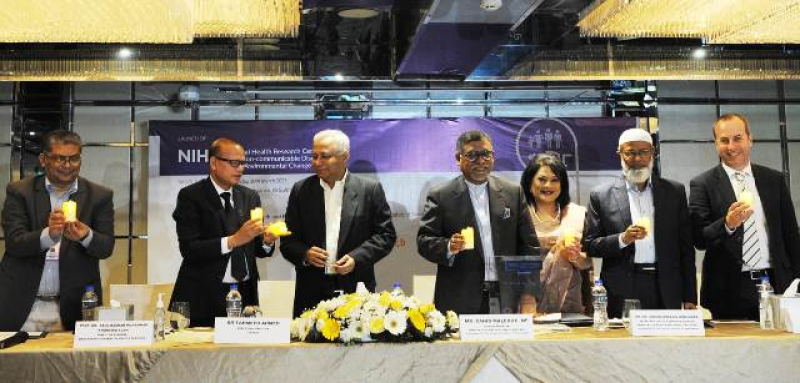- Another July warrier shot in head, critical in Khulna hospital |
- NCP Khulna Chief Critically Shot Amid Rising Political Violence |
- Indian MP Warns Bangladesh Faces Rising Lawlessness |
- Law and Order Must Be Ensured Ahead of Polls: Prof Yunus |
- Tough times ahead, everyone must remain united: Tarique Rahman |
Global Health Research Centre for Non-Contagious Disease opens
The Dhaka-based centre will also work on Environmental Change

NIHR Global Health Research Centre for Non-Communicable Diseases and Environmental Change started its operations in the capital Monday, March 20 2023.
Dhaka, Mar 20 – The recently established NIHR Global Health Research Centre for Non-Communicable Diseases and Environmental Change started its operations in the capital Monday.
The centre was launched at a seminar organised by the Non-Communicable Disease Control (NCDC) Programme of the Directorate General of Health Services (DGHS) and icddr,b, in partnership with Imperial College London, The George Institute for Global Health, Sri Ramachandra Institute of Higher Education and Research, and the University of Brawijaya.
The centre is developing a programme of policy-relevant research, research capacity strengthening, and community engagement to tackle the dual challenges of a rapidly growing burden of non-communicable diseases (NCDs) and the threat of global environmental change in low- and middle-income countries (LMICs) and improve the delivery of high-quality, equitable services for this dual threat, especially for the marginalised population most impacted by environmental change.
In Bangladesh, storm surges caused by tropical cyclones have led to an increase in water salinity across the coastal belt. This has harmful health effects on local populations, including increased blood pressure, progressive kidney disease and gestational hypertension in pregnant women.
Using the existing government primary healthcare systems, the centre will work to identify and test cost-effective, sustainable solutions to reduce salinity, with a focus on hypertension, cardiovascular diseases, and chronic kidney diseases in Koyra upazila of Khulna and Ashasuni upazila of Satkhira.
It will also work towards strengthening primary health care in Bangladesh and develop multisectoral interventions through active engagement with communities that are particularly vulnerable to the effects of environmental change and NCDs.
During the launch event, Dr Tahmeed Ahmed, executive director of icddr,b, hoped the centre would be able to develop low-cost sustainable solutions and advocate for them to prevent and address non-communicable diseases through undertaking implementation research.
Health Minister Zahid Maleque highlighted various government initiatives to combat NCDs, including the eight state-of-the-art hospitals under construction in each division.
He said: "I hope that the research and evidence generated by the NIHR Global Health Research Centre will be instrumental in policy making and strategic decisions to combat NCDs in Bangladesh. The centre and icddr,b will receive all the necessary assistance from my ministry to implement this initiative."
The Bangladesh centre will be directed by Dr Aliya Naheed, scientist (non-communicable diseases) of icddr,b, in collaboration with the NCDC, Department of Public Health Engineering (DPHE), Bangladesh Water Development Board (BWDB), and technical support provided by the University of Dhaka, Bangladesh University of Engineering and Technology (BUET), Imperial College of London, and the University of Portsmouth. - UNB

